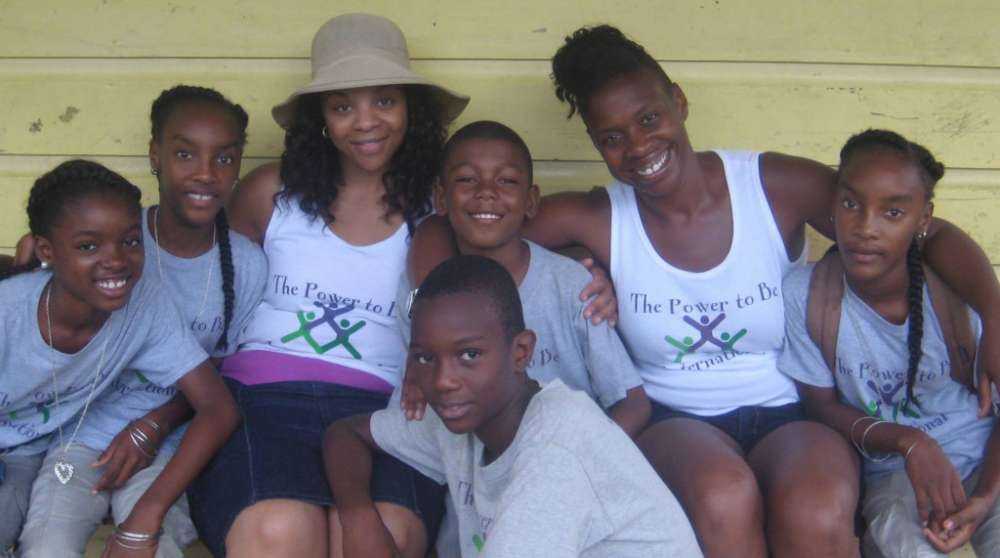on
BY SARA MILLER
Just like watering a plant, self- empowerment and education are the key ingredients in the transformation of today’s youth into the community leaders of tomorrow. With an approximate world population of 1.8 billion young people between the ages of ten and twenty-four, this demographic is the key to creating groundbreaking social progress and change. However, with the majority of the population concentrated in developing countries, most youth see their potential growth hindered by factors such as poverty, economic status and lack of resources available.
After spending a year teaching at the University of the West Indies in Jamaica, Kisha McPherson saw that there was a need for literacy development for children in Negril located in the Westmoreland parish. It was at this moment the seed was planted and McPherson together with her close family friends; Kimya Mignott and Lyn Williams began their journey in creating an organization that helps youth realize their full potential.
Established in 2009, The Power to Be International (PTBI) is a non-profit grassroots organization that is dedicated to empowering underserved youth locally and internationally through educational, leadership and empowerment programs. Currently, the PBTI has a seven-member board of directors made of women who have extensive backgrounds in the education and health fields. Members include: Ifetayo Fleary, Maxine Malcolm, Thursica Kovinthan, Kisha McPherson, Kimya Mignott, Andrea Muir and Lyn-Ann Williams. Originally planned only to be a two-week literacy camp, the organization has outgrown its initial plans and now offers a multitude of successful programs that has helped hundreds of Jamaican children and young adults.
The programs include: Camp Power To Be Literacy and Leadership Camp: Camp Power to Be has grown to cater over sixty students yearly in several streams and concentrates on the development of youth with a focus on literacy and leadership. The streams include the Literacy Stream (ages six to eleven years old) the Leadership Stream (twelve to fourteen years old) and the Employment Readiness stream (ages fifteen and older).
“Our focus is literacy mainly because we felt that was a target need especially among the children and the youth,” said Fleary.
“When I look at where PTBI was before compared to now, we really made big improvements!”
The Engaging Girls: Empowerment, Leadership, Development, and Action: This camp aims to address the issues and challenges that adolescent girls face in today’s society. Through workshops, discussions and activities, young girls learn to develop and maintain better relationships with their peers and encourage self-love and gender equity in their communities. The program is offered for girls residing in the Pickering and Ajax area in Ontario and is funded by the Ontario Trillium Foundation.
The Lumifi for Literacy – Digital Reading Engagement Program (D-REP):
Lead by Toronto District School Board educator and board member Thursica Kovinthan, the D-REP is a ten-week intensive reading program that provides support for struggling and unmotivated high school students in the Caribbean. The goal of the program is to combine technology, quality, literacy resources and teacher training to support high school students who are reading below their grade level. The program is a result of a partnership between Enactus-LUMIFI, the University of Toronto, The Power to Be International and several local high schools in Westmoreland, Jamaica. In addition to the programs offered, PTBI also continues to invest in the future of underserved children through their community build program.
“The first literacy camp took place in an open area beside the Negril All Age School which was the original site. Our first thirty children came from that school and one of the big things that we noticed is that there was not enough adequate space for the students,” Mignott said.
“After some discussion, we decided to get some partners to help us build a classroom extension and the idea went from there.”
With support and funding from partners at the Elementary Teachers Federation of Ontario, The Elementary Teachers of Toronto, Centennial College, The Rotary Club of Negril and S.M.I.L.E., the PTBI has completed three additional community builds at Mt. Airy All Age School in 2013, a ECE playground at Risen Messiah Early Childhood Institute in 2014 and a ECE playground at Prickly Pole Primary School in St. Ann in 2015.
On November 12th, 2016, friends, family and supporters gathered at the Celebration Banquet Hall in Scarborough to celebrate PTBI’s 7th annual Black and Gold Charity Gala. Hosted by Jonathan Shaw, the evening included a beautiful contemporary dance performance from the talented Jada Ricketts and a Jamaican comedy skit performed by Judith and Friends. Finally, professional DUB poet Devine inspired guests with her poetic words of encouragement and self-love in the form of notes which were passed throughout the room.
The gala also featured a raffle draw, which included an all-inclusive paid trip to the beautiful island of Jamaica as well as a seated dinner. With a few words from the PBTI board of directors, the night ended with guests dancing the night away with music provided by King Turbo.
At this point of time, the world has one of the largest generations of young people in history and with that, the opportunities that lie ahead are endless. But according to Mignott, to harness those opportunities, children and young adults alike must learn that they can take charge of their own futures.
“Youth empowerment is so necessary! We have to teach children that they can be whatever they want to be and no matter what their background or situation is, they have the power within them to decide what they what to do if they put their minds to it,” said Mignott.
“The youth are the leaders of tomorrow, so it is important to teach them the value of believing in themselves and being positive global citizens that can contribute to the world and their communities.”
The Power To Be International offers opportunities for post-secondary students, early childhood educators, teachers, families and other social service professionals to volunteer their time and expertise at the literacy camp in Negril, Jamaica. At the camp, volunteers take part in working collaboratively with local Jamaican colleagues to provide mentorship and educational instruction for at-risk Jamaican youth in the Negril community. For more information about this opportunity or to donate to the organization, please visit www.thepowertobe.org.
Stay in the loop with exclusive news, stories, and insights—delivered straight to your inbox. No fluff, just real content that matters. Sign up today!













